Oral antiplatelet therapy for acute ischaemic stroke
- PMID: 35028933
- PMCID: PMC8758582
- DOI: 10.1002/14651858.CD000029.pub4
Oral antiplatelet therapy for acute ischaemic stroke
Abstract
Background: In people with acute ischaemic stroke, platelets become activated and can cause blood clots to form and block an artery in the brain, resulting in damage to part of the brain. Such damage gives rise to the symptoms of stroke. Antiplatelet therapy might reduce the volume of brain damaged by ischaemia and also reduce the risk of early recurrent ischaemic stroke, thereby reducing the risk of early death and improving long-term outcomes in survivors. However, antiplatelet therapy might also increase the risk of fatal or disabling intracranial haemorrhage.
Objectives: To assess the efficacy and safety of immediate oral antiplatelet therapy (i.e. started as soon as possible and no later than two weeks after stroke onset) in people with acute presumed ischaemic stroke.
Search methods: We searched the Cochrane Stroke Group Trials Register, CENTRAL, MEDLINE Ovid, Embase Ovid, and two trials registers, and performed forward reference/cited reference searching in August 2020.
Selection criteria: Randomised controlled trials (RCTs) comparing oral antiplatelet therapy (started within 14 days of the stroke) with control in people with definite or presumed ischaemic stroke.
Data collection and analysis: Two review authors independently applied the inclusion criteria and assessed trial quality. For the included trials, they extracted and cross-checked the data. They assessed risk of bias of each study using the Risk of Bias 1 (RoB1) tool and overall certainty of the evidence for each outcome using the GRADE approach.
Main results: We included 11 studies involving 42,226 participants. Three new trials have been added since the last update (743 participants). As per the previous version of this review, two trials testing aspirin 160 mg to 300 mg once daily, started within 48 hours of onset, contributed 96% of the data. The risk of bias was low. The maximum follow-up was six months. With treatment, there was a decrease in death or dependency at the end of follow-up (odds ratio (OR) 0.95, 95% confidence interval (CI) 0.91 to 0.99; 7 RCTs, 42,034 participants; moderate-certainty evidence). For every 1000 people treated with aspirin, 13 people would avoid death or dependency (number needed to treat for an additional beneficial outcome 79).
Authors' conclusions: Antiplatelet therapy with aspirin 160 mg to 300 mg daily, given orally (or by nasogastric tube or per rectum in people who cannot swallow) and started within 48 hours of onset of presumed ischaemic stroke, significantly decreased death and dependency, and reduced the risk of early recurrent ischaemic stroke without a major risk of early haemorrhagic complications; long-term outcomes were improved.
Copyright © 2021 The Cochrane Collaboration. Published by John Wiley & Sons, Ltd.
Conflict of interest statement
JM:
Figures

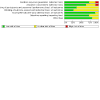

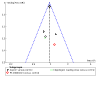
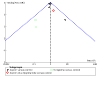
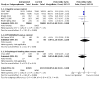

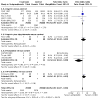

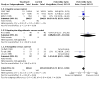


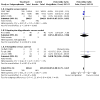
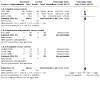
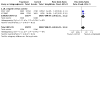
Update of
-
Oral antiplatelet therapy for acute ischaemic stroke.Cochrane Database Syst Rev. 2014 Mar 26;2014(3):CD000029. doi: 10.1002/14651858.CD000029.pub3. Cochrane Database Syst Rev. 2014. Update in: Cochrane Database Syst Rev. 2022 Jan 14;1:CD000029. doi: 10.1002/14651858.CD000029.pub4. PMID: 24668137 Free PMC article. Updated.
References
References to studies included in this review
CAST 1997 {published and unpublished data}
-
- CAST (Chinese Acute Stroke Trial) Collaborative Group. A randomised placebo-controlled trial of early aspirin use in 20,000 patients with acute ischaemic stroke. Lancet 1997;349:1641-9. - PubMed
Ciuffetti 1990 {published and unpublished data}
-
- Ciuffetti G, Aisa G, Mercuri M, Lombardini R, Paltriccia R, Neri C, et al. Effects of ticlopidine on the neurologic outcome and the hemorheologic pattern in the postacute phase of ischemic stroke: a pilot study. Angiology 1990;41:505-11. - PubMed
Di Cesare 2016 {published data only}
-
- Di Cesare F, Mancuso J, Woodward P, Bednar MM, Loudon PT. Phosphodiesterase-5 inhibitor PF-03049423 effect on stroke recovery: a double-blind, placebo-controlled randomized clinical trial. Journal of Stroke and Cerebrovascular Diseases 2016;25:642-9. - PubMed
IST 1997 {published and unpublished data}
-
- International Stroke Trial Collaborative Group. The International Stroke Trial (IST): a randomised trial of aspirin, subcutaneous heparin, both, or neither among 19435 patients with acute ischaemic stroke. Lancet 1997;349:1569-81. - PubMed
Khatri 2018 {published data only}
MAST‐I 1995 {published and unpublished data}
-
- Multicentre Acute Stroke Trial-Italy (MAST-I) Group. Randomised controlled trial of streptokinase, aspirin, and combination of both in treatment of acute ischaemic stroke. Lancet 1995;346:1509-14. - PubMed
Pince 1981 {unpublished data only}
-
- Pince J. Thromboses Veineuses des Membres Inferieures et Embolies Pulmonaires au Cours des Accidents Vasculaires Cerebraux. A Propos d'un Essai Comparatif de Traitment Preventif [these pour le Doctorat d'Etat en Medicine]. Toulouse (France): Universite Paul Sabatier, 1981.
Rödén‐Jüllig 2003 {published data only}
-
- Rödén-Jüllig Å, Britton M, Malmkvist K, Leijd B. Aspirin in the prevention of progressing stroke: a randomized controlled study. Journal of Internal Medicine 2003;254:584-90. - PubMed
Turpie 1983 {unpublished data only}
-
- Turpie AG, Dobkin B, McKenna R. A trial of ticlopidine, an antiplatelet agent, for acute cerebral infarction. Guildford: Sanofi Winthrop (Sanofi internal report 1983.001.6.188) 1983.
Utsumi 1988 {unpublished data only}
-
- Utsumi H. Evaluation of utility of ticlopidine, an antiplatelet agent, for acute cerebral infarction. Guildford: Sanofi Winthrop (Sanofi internal report 001.6.128) 1984.
Zhao 2017 {published data only}
-
- Zhao Y, Yang W, Tan Z, Wang W, Xiao W, Zeng J, et al. Clopidogrel loading dose versus maintenance dose to treat patients with acute ischaemic stroke in China (CLASS-China): results from a prospective double-blind randomised clinical trial. Stroke and Vascular Neurology 2017;2:e000072. - PMC - PubMed
References to studies excluded from this review
Maestrini 2018 {published data only}
Mehta 2015 {published data only}
-
- Mehta S, Ahmad J, Hussain M, Brar J, Chahal H, Shah Y, et al. Safety and efficacy of intravenous eptifibatide as standalone therapy for select acute ischemic stroke patients (SIESTA-I trial). Stroke 2015;46:AWP61.
Nguyen 2020 {published data only}
-
- Nguyen TL, Collins GS, Landais P, Le Manach Y. Counterfactual clinical prediction models could help to infer individualized treatment effects in randomized controlled trials-An illustration with the International Stroke Trial. J Clin Epidemiol 2020;125:47-56. [DOI: 10.1016/j.jclinepi.2020.05.022] - DOI - PubMed
TARDIS {published data only}
-
- Bath P. Triple Antiplatelets for Reducing Dependency After Ischaemic Stroke (TARDIS). www.controlled-trials.com/ISRCTN47823388 (first received 24 October 2008).
Wang 2019 {published data only}
-
- Wang X, Yan Y, Song Y, Ma C. Efficacy of argatroban in the treatment of acute cerebral infarction. Int J Clin Exp Med 2019;12(5):5454-5460.
Additional references
AHA/ASA Guidelines
-
- American Heart Association Stroke Council. Guidelines for the early management of patients with acute ischemic stroke: 2019 update to the 2018 guidelines for the early management of acute ischemic stroke: a guideline for healthcare professionals from the American Heart Association/American Stroke Association. Stroke 2019;50:344-418.
AHA 2013
-
- Go AS, Mozaffarian D, Roger VL, Benjamin EJ, Berry JD, Borden WB, American Heart Association Statistics Committee and Stroke Statistics Subcommittee. Heart disease and stroke statistics – 2013 update: a report from the American Heart Association. Circulation 2013;127:e6-e245. [DOI: 10.1161/CIR.0b013e31828124ad] - DOI - PMC - PubMed
ATC 1994a
ATC 1994b
ATC 2002
ATC 2009
Bamford 1989
-
- Bamford J, Sandercock P, Warlow C, Slattery J. Inter-observer agreement for the assessment of handicap in stroke patients. Stroke 1989;20:8. - PubMed
Bath 2004a
Bath 2004b
CAIST 2011
Candelise 1994
-
- Candelise L, Pinardi G, Aritzu E, Musicco M. Telephone interview for stroke outcome assessment. Cerebrovascular Diseases 1994;4:341-3.
Chairangsarit 2005
-
- Chairangsarit P, Sithinamsuwan P, Niyasom S, Udommongkol C, Nidhinandana S, Suwantamee J. Comparison between aspirin combined with dipyridamole versus aspirin alone within 48 hours after ischemic stroke event for prevention of recurrent stroke and improvement of neurological function: a preliminary study. Journal of the Medical Association of Thailand 2005;88:S148-54. - PubMed
CHANCE 2013
Chen 2000
-
- Chen ZM, Sandercock P, Pan HC, Counsell C, Collins R, Liu LS, et al. Indications for early aspirin use in acute ischemic stroke: a combined analysis of 40,000 randomized patients from the Chinese Acute Stroke Trial and the International Stroke Trial. On behalf of the CAST and IST Collaborative Groups. Stroke 2000;31:1240-9. - PubMed
Ciccone 2014
Collins 1996
CSS 2010
-
- Canadian Stroke Network and Heart and Stroke Foundation of Canada. Canadian best practice recommendations for stroke care: update 2010. www.canadianstrokenetwork.ca/ (accessed prior to 24 November 2021).
Dalen 2006
-
- Dalen JE. Aspirin to prevent heart attack and stroke: what's the right dose? American Journal of Medicine 2006;119:198-202. - PubMed
Davenport 1996
-
- Davenport R, Dennis M, Wellwood I, Warlow C. Complications after acute stroke. Stroke 1996;27:415-20. - PubMed
Dennis 1997
-
- Dennis M, Wellwood I, Warlow C. Are simple questions a valid measure of outcome after stroke? Cerebrovascular Diseases 1997;7:22-7.
EARLY 2010
-
- Dengler R, Diener HC, Schwartz A, Grond M, Schumacher H, Machnig T, EARLY Investigators. Early treatment with aspirin plus extended-release dipyridamole for transient ischaemic attack or ischaemic stroke within 24 h of symptom onset (EARLY trial): a randomised, open-label, blinded-endpoint trial. Lancet Neurology 2010;9:159-66. [DOI: 10.1016/S1474-4422(09)70361-8] - DOI - PubMed
ESO 2008
GBD 2019
GRADEpro GDT [Computer program]
-
- GRADEpro GDT. Hamilton (ON): McMaster University (developed by Evidence Prime), (accessed 24 February 2021). Available at gradepro.org.
Hankey 2010
-
- Hankey GJ, Hacke W, Easton JD, Johnston SC, Mas JL, Brennan DM, CHARISMA Trial Investigators. Effect of clopidogrel plus ASA vs. ASA early after TIA and ischaemic stroke: a substudy of the CHARISMA trial. International Journal of Stroke 2010;41:1679-83. [DOI: 10.1161/STROKEAHA.110.586727] - DOI - PubMed
Higgins 2011
-
- Higgins JP, Green S, editor(s). Cochrane Handbook for Systematic Reviews of Interventions Version 5.1.0 (updated March 2011). The Cochrane Collaboration, 2011. Available from training.cochrane.org/handbook/archive/v5.1/.
Higgins 2020
-
- Higgins JP, Green S, editor(s). Cochrane Handbook for Systematic Reviews of Interventions Version 6.1.0 (updated March 2020). Cochrane, 2020. Available from training.cochrane.org/handbook/archive/v6.1.
IST 1996
Jauch 2013
-
- Jauch EC, Saver JL, Adams HP Jr, Bruno A, Connors JJ, Demaerschalk BM, American Heart Association Stroke Council, Council on Cardiovascular Nursing, Council on Peripheral Vascular Disease, Council on Clinical Cardiology. Guidelines for the early management of patients with acute ischemic stroke: a guideline for healthcare professionals from the American Heart Association/American Stroke Association. Stroke 2013;44:870-947. [DOI: 10.1161/STR.0b013e318284056a] - DOI - PubMed
Keir 2002
-
- Keir S, Wardlaw J, Sandercock PA, Chen Z. Antithrombotic therapy in patients with any form of intracranial haemorrhage: a systematic review of the available controlled studies. Cerebrovascular Diseases 2002;14(3-4):197-206. - PubMed
Krishnamurthi 2020
-
- Krishnamurthi RV, Ikeda T, Feigin VL. Global, regional and country-specific burden of ischaemic stroke, intracerebral haemorrhage and subarachnoid haemorrhage: a systematic analysis of the Global Burden of Disease Study 2017. Neuroepidemiology 2020;54:171-9. [DOI: ] - PubMed
MedStrategy 1995
-
- Dick E. Stroke: a Focus of Opportunity. St Louis (MO): MedStrategy, 1995.
Minhas 2017
Naqvi 2020
-
- Naqvi IA, Kamal AK, Rehman HNaqvi IA, Kamal AK, Rehman H. Multiple versus fewer antiplatelet agents for preventing early recurrence after ischaemic stroke or transient ischaemic attack. Cochrane Database of Systematic Reviews 2020;8(8):CD009716. [DOI: 10.1002/14651858.CD009716.pub2] - DOI - PMC - PubMed
NINDS 1995
-
- The National Institute of Neurological Disorders and Stroke rt-PA Stroke Study Group. Tissue plasminogen activator for acute ischaemic stroke. New England Journal of Medicine 1995;333:1581-7. - PubMed
Odgaard‐Jensen 2011
Patrono 1994
-
- Patrono C. Aspirin as an antiplatelet drug. New England Journal of Medicine 1994;330:1287-94. - PubMed
Patrono 1998
-
- Patrono C, Coller B, Dalen JE, Fuster V, Gent M, Harker LA, et al. Platelet-active drugs: the relationships among dose, effectiveness, and side effects. Chest 1998;114:470S-88S. - PubMed
POINT
RCP Guideline 2016
-
- Royal College of Physicians. National Clinical Guidelines for Stroke, Fifth Edition 2016. www.rcplondon.ac.uk/resources/stroke-guidelines (accessed prior to 24 November 2021).
RESTART 2019
Review Manager 2020 [Computer program]
-
- Review Manager (RevMan). Version 5.4. Copenhagen: Nordic Cochrane Centre, The Cochrane Collaboration, 2020.
Ricci 2012
Schünemann 2013
-
- Schünemann H, Brożek J, Guyatt G, Oxman A, editor(s). Handbook for grading the quality of evidence and the strength of recommendations using the GRADE approach (updated October 2013). GRADE Working Group, 2013. Available from gdt.guidelinedevelopment.org/app/handbook/handbook.html.
SOCRATES
-
- Johnston SC, Amarenco P, Albers GW, Denison H, Easton JD, Evans SR, SOCRATES Steering Committee and Investigators. Ticagrelor versus aspirin in acute stroke or transient ischemic attack. New England Journal of Medicine 2016;375(1):35-43. - PubMed
Suri 2008
-
- Suri MF, Hussein HM, Abdelmoula MM, Divani AA, Qureshi AI. Safety and tolerability of 600 mg clopidogrel bolus in patients with acute ischemic stroke: preliminary experience. Medical Science Monitor 2008;14:I39-44. - PubMed
SUTC 2013
TARDIS
-
- Bath PM, Woodhouse LJ, Appleton JP, Beridze M, Christensen H, Dineen RA, TARDIS Investigators. Antiplatelet therapy with aspirin, clopidogrel, and dipyridamole versus clopidogrel alone or aspirin and dipyridamole in patients with acute cerebral ischaemia (TARDIS): a randomised, open-label, phase 3 superiority trial. Lancet 2018;391(10123):850-9. - PMC - PubMed
THALES
-
- Johnston SC, Amarenco P, Denison H, Evans SR, Himmelmann A, James S, THALES Investigators. Ticagrelor and aspirin or aspirin alone in acute ischemic stroke or TIA. New England Journal of Medicine 2020;383(3):207-17. - PubMed
Tsai 2013
van Gijn 1992
-
- Gijn J. Aspirin: dose and indications in modern stroke prevention. Neurologic Clinics 1992;10:193-209. - PubMed
van Kooten 1994
-
- Kooten F, Ciabattone G, Patrono C, Schmitz PI, Gijn J, Koudstaal PJ. Evidence for episodic platelet activation in acute ischaemic stroke. Stroke 1994;25:278-81. - PubMed
van Kooten 1997
-
- Kooten F, Ciabattoni G, Patrono C, Dippel DW, Koudstaal PJ. Platelet activation and lipid peroxidation in patients with acute ischaemic stroke. Stroke 1997;28:1557-63. - PubMed
Wardlaw 2009
Wardlaw 2014
Warlow 2001
-
- Warlow C. Stroke, transient ischaemic attacks, and intracranial venous thrombosis. In: Donaghy M, editors(s). Brain's Diseases of the Nervous System. 11th edition. Oxford (UK): Oxford University Press, 2001:775-896.
References to other published versions of this review
Sandercock 2003
Publication types
MeSH terms
Substances
LinkOut - more resources
Full Text Sources
Medical
Research Materials

